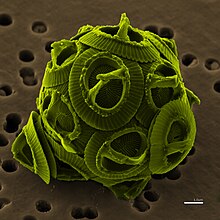Hacrobia
Susunan cryptomonad-haptophyte adalah sebuah pengelompokan eukariota unisel yang tidak tergolong ke Supergrup SAR yang diusulkan namun diperdebatkan.[1] Beberapa nama alternatif sudah digunakan untuk kelompok ini, seperti Hacrobia (dari "ha-" untuk Haptophyta, "-cr-" untuk cryptomonad, dan "-bia" sebagaia akhiran umum untuk "kehidupan");[2] CCTH (singkatan untuk Cryptophyta, Centrohelida, Telonemia dan Haptophyta);[3] dan Eukaryomonadae.[4]
| Hacrobia | |
|---|---|
| Taksonomi | |
| Superkerajaan | Eukaryota |
| Kerajaan | Chromista |
| Subkerajaan | Hacrobia |
| Tata nama | |
| Sinonim takson |
|
| Groups | |
Hingga Februari 2012[update], masih belum jelas apakah kelompok ini monofiletik atau tidak; hasil studi filogenetika "umumnya tergantung oleh pemilihan set data takson dan gen".[3] Dua studi 2012 menghasilkan hasil yang berkebalikan.[3][5]
Referensi
sunting- ^ Sakaguchi M, Takishita K, Matsumoto T, Hashimoto T, Inagaki Y (July 2009). "Tracing back EFL gene evolution in the cryptomonads-haptophytes assemblage: separate origins of EFL genes in haptophytes, photosynthetic cryptomonads, and goniomonads". Gene. 441 (1–2): 126–31. doi:10.1016/j.gene.2008.05.010. PMID 18585873.
- ^ Okamoto, N.; Chantangsi, C.; Horák, A.; Leander, B.; Keeling, P.; Stajich, J. E. (2009). Stajich, Jason E., ed. "Molecular Phylogeny and Description of the Novel Katablepharid Roombia truncata gen. et sp. nov., and Establishment of the Hacrobia Taxon nov". PLOS ONE. 4 (9): e7080. Bibcode:2009PLoSO...4.7080O. doi:10.1371/journal.pone.0007080 . PMC 2741603 . PMID 19759916.
- ^ a b c Zhao, Sen; Burki, Fabien; Bråte, Jon; Keeling, Patrick J.; Klaveness, Dag; Shalchian-Tabrizi, Kamran (2012). "Collodictyon—An Ancient Lineage in the Tree of Eukaryotes". Molecular Biology and Evolution. 29 (6): 1557–68. doi:10.1093/molbev/mss001. PMC 3351787 . PMID 22319147.
- ^ "EUKARYOMONADAE". Diakses tanggal 2015-03-01.
- ^ Burki, F.; Okamoto, N.; Pombert, J.F.; Keeling, P.J. (2012). "The evolutionary history of haptophytes and cryptophytes: phylogenomic evidence for separate origins". Proc. Biol. Sci. 279 (1736): 2246–54. doi:10.1098/rspb.2011.2301. PMC 3321700 . PMID 22298847.
